The Epistle of Saint Paul The Apostle to the Romans continues without comment:
The Duties of Christians:
 I exhort you therefore, brethren, by the mercy of God, to present your bodies as a sacrifice, living, holy, pleasing to God—your spiritual service. And be not conformed to this world, but be transformed into the newness of your mind, that you may discern what is the good and acceptable and perfect will of God.
I exhort you therefore, brethren, by the mercy of God, to present your bodies as a sacrifice, living, holy, pleasing to God—your spiritual service. And be not conformed to this world, but be transformed into the newness of your mind, that you may discern what is the good and acceptable and perfect will of God.
Humility and Concord:
By the grace that has been given to me, I say to each one among you: let no one rate himself more than he ought, but let him rate himself according to moderation, and as according to as God has appointed to each one the measure of faith. For just as in one body we have many members, yet all the members have not the same function, so we, the many, are one body in Christ, but severally members one of another. But we have gifts differing according to the grace that has been given us, such as prophecy to be used according to the proportion of faith; or ministry, in ministering; or he who teaches, in teaching; he who exhorts, in exhorting; he who gives, in simplicity; he who presides, with carefulness; he who shows mercy, with cheerfulness.
Fraternal Charity:
 Let love be without pretense. Hate what is evil, hold to what is good. Love one another with fraternal charity, anticipating one another with honor. Be not slothful in zeal; be fervent in spirit, serving the Lord, rejoicing in hope. Be patient in tribulation, persevering in prayer. Share the needs of the saints, practicing hospitality. Bless those who persecute you; bless and do not curse. Rejoice with those who rejoice; weep with those who weep. Be of one mind towards another. Do not set your mind on high things but condescend to the lowly. Be not wise in your own conceits. To no man render evil for evil, but provide good things not only in the sight of God, but also in the sight of all men. If it be possible, as far as in you lies, be at peace with all men. Do not avenge yourselves, beloved, but give place to the wrath, for it is written, “Vengeance is mine; I will repay, says the Lord.” But “If thy enemy is hungry, give him food; if he is thirsty, give him drink; for by so doing thou wilt heap coals of fire upon his head.” Be not overcome by evil, but overcome evil with good.
Let love be without pretense. Hate what is evil, hold to what is good. Love one another with fraternal charity, anticipating one another with honor. Be not slothful in zeal; be fervent in spirit, serving the Lord, rejoicing in hope. Be patient in tribulation, persevering in prayer. Share the needs of the saints, practicing hospitality. Bless those who persecute you; bless and do not curse. Rejoice with those who rejoice; weep with those who weep. Be of one mind towards another. Do not set your mind on high things but condescend to the lowly. Be not wise in your own conceits. To no man render evil for evil, but provide good things not only in the sight of God, but also in the sight of all men. If it be possible, as far as in you lies, be at peace with all men. Do not avenge yourselves, beloved, but give place to the wrath, for it is written, “Vengeance is mine; I will repay, says the Lord.” But “If thy enemy is hungry, give him food; if he is thirsty, give him drink; for by so doing thou wilt heap coals of fire upon his head.” Be not overcome by evil, but overcome evil with good.
Obedience:
Let everyone be subject to the higher authorities, for there exists no authority except from God, and those who exist have been appointed by God. Therefore he who resists the authority resists the ordinance of God; and they that resist bring on themselves condemnation. For rulers are a terror not to the good work but to the evil. Dost thou wish, then, not to fear authority? Do what is good and thou wilt have praise from it. For it is God’s minister to thee for good. But if thou does what is evil, fear, for not without reason does it carry the sword. For it is God’s minister, an avenger to execute wrath on him who does evil. Wherefore you must needs be subject, not only because of the wrath, but also for conscience’ sake. For this is also why you pay tribute, for they are the ministers of God, serving unto this very end. Render to all men whatever is their due; tribute to whom tribute is due; taxes to whom taxes are due; fear to whom fear is due; honor to whom honor is due.
Charity a Social Duty:
Owe no man anything except to love one another; for he who loves his neighbor has fulfilled the Law. For “Thou shalt not commit adultery. Thou shalt not kill. Thou shalt not steal. Thou shall not covet”; and if there is any other commandment, it is summed up in this saying, “Thou shalt love thy neighbor as thyself.” Loves does no evil to a neighbor. Love therefore is the fulfillment of the Law.
The Spirit of Christ:
And this do, understanding the time, for it is now the hour for us to rise from sleep, because now our salvation is nearer than when we came to believe. The night is far advanced, the day is at hand. Let us therefore lay aside the works of darkness, and put on the armor of light. Let us walk becomingly as in the day, not in revelry or drunkenness, not in debauchery and wantonness, not in strife and jealousy. But put on the Lord Jesus Christ, and as for the flesh, take no thought for its lusts.
Mutual Forbearance:
But him who is weak in faith, receive, without disputes about opinions. For one believes he may eat all things; but he who is weak, let him eat vegetables. Let not him who eats despise him who does not eat, and let him who does not eat judge him who eats: for God has received him. Who art thou to judge another’s servant? To his own lord he stands or falls; but he will stand, for God is able to make him stand. For one esteems one day above another; another esteems every day alike. Let everyone be convinced in his own mind. He who regards the day, regards it for the Lord; and he who eats, eats for the Lord, for he gives thanks to God. And he who does not eat, abstains for the Lord, and gives thanks to God. For none of us lives to himself, and none dies to himself; for if we live, we live to the Lord, or if we die, we die to the Lord. Therefore, whether we live or die, we are the Lord’s. For to this end Christ died and rose again, that he might be Lord of both the dead and the living. But thou, why dost thou judge thy brother? Or thou, why dost thou despise thy brother? For we shall all stand at the judgment-seat of God; for it is written “As I live, says the Lord, to me every knee shall bend, and every tongue shall give praise to God.”
Charity and Peace:
Therefore every one of us will render an account for himself to God. Therefore let us no longer judge one another, but rather judge this, that you should not put a stumbling-block or a hindrance in your brother’s way. I know and am confident in the Lord Jesus that nothing is of itself unclean; but to him that regards anything as unclean, to him it is unclean. If, then, thy brother is grieved because of thy food, no longer dost thou walk according to charity. Do not with thy food destroy him for whom Christ died. Let not, then, our good be reviled. For the kingdom of God does not exist in food and drink, but in justice and peace, and joy in the Holy Spirit; for he who in this way serves Christ pleases God and is approved by men. Let us, then, follow after the things that make for peace, and let us safeguard the things that make for mutual edification. Do not for the sake of food destroy the work of God! All things indeed are clean; but a thing is evil for the man who eats through scandal. It is good not to eat meat and not to drink wine, nor to do anything by which thy brother is offended or scandalized or weakened. Thou hast faith. Keep it to thyself before God. Blessed is he who does not condemn himself by what he approves. But he who hesitates, if he eats, is condemned, because it is not from faith; for all that is not from faith is sin.
And there you have it–the Spirit of the Lord Jesus Christ is Love!

Day 144: Reading The Bible with a TROML Perspective; The Spirit of the Lord Jesus Christ is Love!
Read and inspired by the New Testament, The Epistle of Saint Paul The Apostle to the Romans, Chapters 12-14.
Bible Notes:
Saint Paul in this letter gives the fullest explanation of his doctrine. In the first eleven chapters he explains that justification is through faith in Christ and not through the works of the Jewish Law. The last five chapters are directions for the conduct of a Christian life.
Romans Chapter 12: The duties of Christians; Humility and concord; Fraternal charity.
The Duties of Christians:
I exhort you therefore, brethren, by the mercy of God, to present your bodies as a sacrifice, living, holy, pleasing to God—your spiritual service. And be not conformed to this world, but be transformed into the newness of your mind, that you may discern what is the good and acceptable and perfect will of God.
Humility and Concord:
By the grace that has been given to me, I say to each one among you: let no one rate himself more than he ought, but let him rate himself according to moderation, and as according to as God has appointed to each one the measure of faith. For just as in one body we have many members, yet all the members have not the same function, so we, the many, are one body in Christ, but severally members one of another. But we have gifts differing according to the grace that has been given us, such as prophecy to be used according to the proportion of faith; or ministry, in ministering; or he who teaches, in teaching; he who exhorts, in exhorting; he who gives, in simplicity; he who presides, with carefulness; he who shows mercy, with cheerfulness.
Fraternal Charity:
Let love be without pretense. Hate what is evil, hold to what is good. Love one another with fraternal charity, anticipating one another with honor. Be not slothful in zeal; be fervent in spirit, serving the Lord, rejoicing in hope. Be patient in tribulation, persevering in prayer. Share the needs of the saints, practicing hospitality. Bless those who persecute you; bless and do not curse. Rejoice with those who rejoice; weep with those who weep. Be of one mind towards another. Do not set your mind on high things but condescend to the lowly. Be not wise in your own conceits. To no man render evil for evil, but provide good things not only in the sight of God, but also in the sight of all men. If it be possible, as far as in you lies, be at peace with all men. Do not avenge yourselves, beloved, but give place to the wrath, for it is written, “Vengeance is mine; I will repay, says the Lord.” But “If thy enemy is hungry, give him food; if he is thirsty, give him drink; for by so doing thou wilt heap coals of fire upon his head.” Be not overcome by evil, but overcome evil with good.
Romans Chapter 13: Obedience; Charity a social duty; The spirit of Christ.
Obedience:
Let everyone be subject to the higher authorities, for there exists no authority except from God, and those who exist have been appointed by God. Therefore he who resists the authority resists the ordinance of God; and they that resist bring on themselves condemnation. For rulers are a terror not to the good work but to the evil. Dost thou wish, then, not to fear authority? Do what is good and thou wilt have praise from it. For it is God’s minister to thee for good. But if thou does what is evil, fear, for not without reason does it carry the sword. For it is God’s minister, an avenger to execute wrath on him who does evil. Wherefore you must needs be subject, not only because of the wrath, but also for conscience’ sake. For this is also why you pay tribute, for they are the ministers of God, serving unto this very end. Render to all men whatever is their due; tribute to whom tribute is due; taxes to whom taxes are due; fear to whom fear is due; honor to whom honor is due.
Charity a Social Duty:
Owe no man anything except to love one another; for he who loves his neighbor has fulfilled the Law. For “Thou shalt not commit adultery. Thou shalt not kill. Thou shalt not steal. Thou shall not covet”; and if there is any other commandment, it is summed up in this saying, “Thou shalt love thy neighbor as thyself.” Loves does no evil to a neighbor. Love therefore is the fulfillment of the Law.
Note: The Commandments omitted from above four: 1) I am the Lord thy God; thou shalt have no other gods before me. 2) Thou shalt not make unto thee any graven image. 3) Thou shalt not take the name of the Lord thy God in vain. 4) Remember the sabbath day, to keep it holy. 5) Honour thy father and thy mother. 6) Thou shalt not bear false witness against thy neighbor.
The Spirit of Christ:
And this do, understanding the time, for it is now the hour for us to rise from sleep, because now our salvation is nearer than when we came to believe. The night is far advanced, the day is at hand. Let us therefore lay aside the works of darkness, and put on the armor of light. Let us walk becomingly as in the day, not in revelry or drunkenness, not in debauchery and wantonness, not in strife and jealousy. But put on the Lord Jesus Christ, and as for the flesh, take no thought for its lusts.
Romans Chapter 14: Mutual forbearance; Charity and peace.
Mutual Forbearance:
But him who is weak in faith, receive, without disputes about opinions. For one believes he may eat all things; but he who is weak, let him eat vegetables. Let not him who eats despise him who does not eat, and let him who does not eat judge him who eats: for God has received him. Who art thou to judge another’s servant? To his own lord he stands or falls; but he will stand, for God is able to make him stand. For one esteems one day above another; another esteems every day alike. Let everyone be convinced in his own mind. He who regards the day, regards it for the Lord; and he who eats, eats for the Lord, for he gives thanks to God. And he who does not eat, abstains for the Lord, and gives thanks to God. For none of us lives to himself, and none dies to himself; for if we live, we live to the Lord, or if we die, we die to the Lord. Therefore, whether we live or die, we are the Lord’s. For to this end Christ died and rose again, that he might be Lord of both the dead and the living. But thou, why dost thou judge thy brother? Or thou, why dost thou despise thy brother? For we shall all stand at the judgment-seat of God; for it is written “As I live, says the Lord, to me every knee shall bend, and every tongue shall give praise to God.”
Charity and Peace:
Therefore every one of us will render an account for himself to God. Therefore let us no longer judge one another, but rather judge this, that you should not put a stumbling-block or a hindrance in your brother’s way. I know and am confident in the Lord Jesus that nothing is of itself unclean; but to him that regards anything as unclean, to him it is unclean. If, then, thy brother is grieved because of thy food, no longer dost thou walk according to charity. Do not with thy food destroy him for whom Christ died. Let not, then, our good be reviled. For the kingdom of God does not exist in food and drink, but in justice and peace, and joy in the Holy Spirit; for he who in this way serves Christ pleases God and is approved by men. Let us, then, follow after the things that make for peace, and let us safeguard the things that make for mutual edification. Do not for the sake of food destroy the work of God! All things indeed are clean; but a thing is evil for the man who eats through scandal. It is good not to eat meat and not to drink wine, nor to do anything by which thy brother is offended or scandalized or weakened. Thou hast faith. Keep it to thyself before God. Blessed is he who does not condemn himself by what he approves. But he who hesitates, if he eats, is condemned, because it is not from faith; for all that is not from faith is sin.
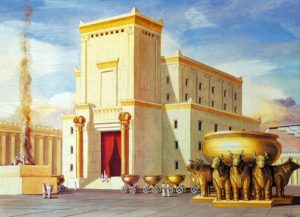 Once the Temple was finished…
Once the Temple was finished… Solomon’s prayer: “Lord God of Israel, there is no God like thee in heaven above, or on earth beneath: who keepest covenant and mercy with thy servants that have walked before thee with all their heart… whatsoever they shall pray for in this place, and hear them in the place of thy dwelling in heaven; and when thou hearest, show them mercy… and forgive the sin of thy people Israel… and show them the good way wherein they should walk… when a man shall know the wound of his own heart, and shall spread forth his hands in this house, then hear thou in heaven, in the place of thy dwelling, and forgive, and do so to every one according to his ways, as thou shalt see his heart…”
Solomon’s prayer: “Lord God of Israel, there is no God like thee in heaven above, or on earth beneath: who keepest covenant and mercy with thy servants that have walked before thee with all their heart… whatsoever they shall pray for in this place, and hear them in the place of thy dwelling in heaven; and when thou hearest, show them mercy… and forgive the sin of thy people Israel… and show them the good way wherein they should walk… when a man shall know the wound of his own heart, and shall spread forth his hands in this house, then hear thou in heaven, in the place of thy dwelling, and forgive, and do so to every one according to his ways, as thou shalt see his heart…” “But if they sin against thee (for there is no man who sinneth not) and thou being angry deliver them up to their enemies, so that they be led away captives into the land of their enemies far or near; then of they do penance in their hear in the place of captivity, and being converted make supplication to thee in their captivity saying: ‘We have sinned, we have done unjustly, we have committed wickedness, and return to thee with all their heart, and all their soul, in the land of their enemies… then hear thou in heaven… and do judgment for them. And forgive thy people, who have sinned against thee, and all their iniquities, by which they have transgressed against thee: and give them mercy before them that have made them captives, that they may have compassion on them.”
“But if they sin against thee (for there is no man who sinneth not) and thou being angry deliver them up to their enemies, so that they be led away captives into the land of their enemies far or near; then of they do penance in their hear in the place of captivity, and being converted make supplication to thee in their captivity saying: ‘We have sinned, we have done unjustly, we have committed wickedness, and return to thee with all their heart, and all their soul, in the land of their enemies… then hear thou in heaven… and do judgment for them. And forgive thy people, who have sinned against thee, and all their iniquities, by which they have transgressed against thee: and give them mercy before them that have made them captives, that they may have compassion on them.” Solomon blesses all Israel: “The Lord our God be with us, as he was with our fathers, and not leave us, nor cast us off, but may he incline our hearts to himself, that we may walk in all his ways, and keep his commandments, and his ceremonies, and all his judgments which he commanded our fathers…. that all the people of the earth may know, that the Lord he is God, and there is no other besides him. Let our hearts also be perfect with the Lord our God, that we may walk in his statues, and keep his commandments, as at this day.”
Solomon blesses all Israel: “The Lord our God be with us, as he was with our fathers, and not leave us, nor cast us off, but may he incline our hearts to himself, that we may walk in all his ways, and keep his commandments, and his ceremonies, and all his judgments which he commanded our fathers…. that all the people of the earth may know, that the Lord he is God, and there is no other besides him. Let our hearts also be perfect with the Lord our God, that we may walk in his statues, and keep his commandments, as at this day.”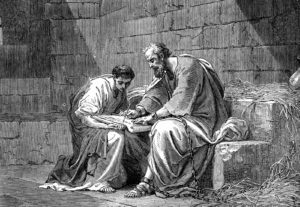 With gratitude to Saint Apostle Paul and Tertius, the writer this epistle, here is the rest of The Epistle of Saint Paul The Apostle to the Romans without comment:
With gratitude to Saint Apostle Paul and Tertius, the writer this epistle, here is the rest of The Epistle of Saint Paul The Apostle to the Romans without comment: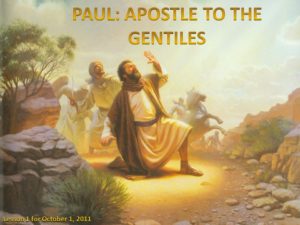
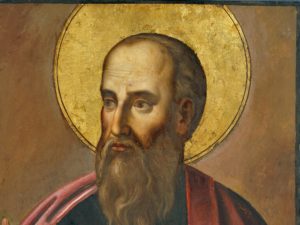 This is why I was hindered so many times from coming to you. But now, having no more works in these parts, and having had for many years a great desire to come to you, when I set out for Spain I hope to see you as I pass through (and by you to be sped on my way there), having first enjoyed being with you for a while. Now, however, I will set out for Jerusalem to minister to the saints. For Macedonia and Achaia have thought it well to make a contribution to the poor among the saint at Jerusalem. So it has pleased them, and their debtors they are. For if the Gentiles have shared in their spiritual blessings, they should also minister to them in material things. Therefore, when I have completed this, and have delivered to them the proceeds, I will set out by way of you for Spain. And I know that when I come to you, I shall come with the fullness of Christ’s blessing.
This is why I was hindered so many times from coming to you. But now, having no more works in these parts, and having had for many years a great desire to come to you, when I set out for Spain I hope to see you as I pass through (and by you to be sped on my way there), having first enjoyed being with you for a while. Now, however, I will set out for Jerusalem to minister to the saints. For Macedonia and Achaia have thought it well to make a contribution to the poor among the saint at Jerusalem. So it has pleased them, and their debtors they are. For if the Gentiles have shared in their spiritual blessings, they should also minister to them in material things. Therefore, when I have completed this, and have delivered to them the proceeds, I will set out by way of you for Spain. And I know that when I come to you, I shall come with the fullness of Christ’s blessing. Now I exhort you, brethren, that you watch those who cause dissensions and scandals contrary to the doctrine that you have learned, and avoid them. For such do not serve Christ our Lord but their own belly, and by smooth words and flattery deceive the hearts of the simple. For you submission to the faith has been published everywhere. I rejoice therefore over you. Yet I will have you wise to what is good, and guileless as to what is evil. But the God, of peace will speedily crush Satan under your feet. The grace of our Lord Jesus Christ be with you.
Now I exhort you, brethren, that you watch those who cause dissensions and scandals contrary to the doctrine that you have learned, and avoid them. For such do not serve Christ our Lord but their own belly, and by smooth words and flattery deceive the hearts of the simple. For you submission to the faith has been published everywhere. I rejoice therefore over you. Yet I will have you wise to what is good, and guileless as to what is evil. But the God, of peace will speedily crush Satan under your feet. The grace of our Lord Jesus Christ be with you. Timothy, my fellow-laborer, greets you, and Lucine, and Jason, and Sosipater, my kinsman. I, Tertius, who have written this epistle, greet you in the Lord. Gaius, my host, and the host of the whole church, greets you. Erastus, the city treasurer, and Quartus, our brother, greet you. [May the grace of our Lord Jesus Christ be with you all, amen.]
Timothy, my fellow-laborer, greets you, and Lucine, and Jason, and Sosipater, my kinsman. I, Tertius, who have written this epistle, greet you in the Lord. Gaius, my host, and the host of the whole church, greets you. Erastus, the city treasurer, and Quartus, our brother, greet you. [May the grace of our Lord Jesus Christ be with you all, amen.]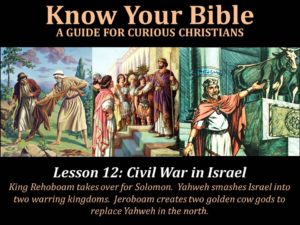 Amazing how after 40 years of a successful King Solomon rule over a unified and prosperous Israel, how quickly the situation can change and deteriorate with his death and his son Roboam replacing him.
Amazing how after 40 years of a successful King Solomon rule over a unified and prosperous Israel, how quickly the situation can change and deteriorate with his death and his son Roboam replacing him.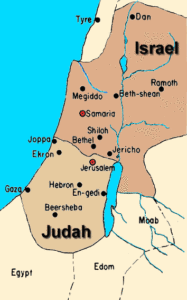 Net result Roboam’s kingdom was Jerusalem and the houses of Juda and Benjamin. Roboam had two houses and Jeroboam had ten houses—all of which returned to their homeland and did not fight against their Israel brethren.
Net result Roboam’s kingdom was Jerusalem and the houses of Juda and Benjamin. Roboam had two houses and Jeroboam had ten houses—all of which returned to their homeland and did not fight against their Israel brethren. 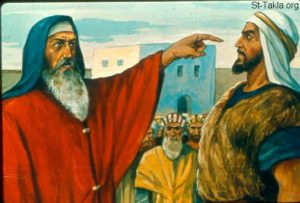 And all the men of Juda shouted: and behold when they shouted, God terrified Jeroboam, and all Israel that stood against Abia and Juda. And the children of Israel fled before Juda, and the Lord delivered them into their hand. And Abia and his people slew them with a great slaughter, and there fell wounded of Israel five hundred thousand valiant men. And the children of Israel were brought down, at that time, and the children of Juda were exceedingly strengthened, because they had trusted in the Lord the God of their fathers… And Jeroboam was not able to resist any more, in the days of Abia; and the Lord struck him, and he died.
And all the men of Juda shouted: and behold when they shouted, God terrified Jeroboam, and all Israel that stood against Abia and Juda. And the children of Israel fled before Juda, and the Lord delivered them into their hand. And Abia and his people slew them with a great slaughter, and there fell wounded of Israel five hundred thousand valiant men. And the children of Israel were brought down, at that time, and the children of Juda were exceedingly strengthened, because they had trusted in the Lord the God of their fathers… And Jeroboam was not able to resist any more, in the days of Abia; and the Lord struck him, and he died.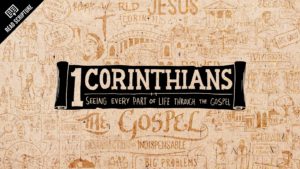 Like Saint Paul the Apostle’s epistle to the Romans, the first taste of his epistle to the Corinthians is very similar—very powerful!
Like Saint Paul the Apostle’s epistle to the Romans, the first taste of his epistle to the Corinthians is very similar—very powerful!
 And when Asa had heard the words, and the prophecy of Azarias the son of Oded the prophet, he took courage, and took away the idols out of all the land of Juda, and out of Benjamin… and he gathered… the strangers… for many were come to him out of Israel, seeing that the Lord his God was with him… And he went to confirm as usual the covenant, that they should seek the Lord the God of their fathers with all their heart, and with all their soul. And if any one, said he, seek not the Lord the God of Israel, let him die, whether little or great, man or woman. And they swore to the Lord with a loud voice with joyful shouting, and with sound of trumpet, and sound of cornets, all that were in Juda with a curse: for with all their heart they swore, and with all their will they sought him, and they found him, and the Lord gave them rest year round.
And when Asa had heard the words, and the prophecy of Azarias the son of Oded the prophet, he took courage, and took away the idols out of all the land of Juda, and out of Benjamin… and he gathered… the strangers… for many were come to him out of Israel, seeing that the Lord his God was with him… And he went to confirm as usual the covenant, that they should seek the Lord the God of their fathers with all their heart, and with all their soul. And if any one, said he, seek not the Lord the God of Israel, let him die, whether little or great, man or woman. And they swore to the Lord with a loud voice with joyful shouting, and with sound of trumpet, and sound of cornets, all that were in Juda with a curse: for with all their heart they swore, and with all their will they sought him, and they found him, and the Lord gave them rest year round.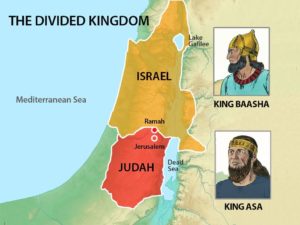 Then Asa brought out silver and gold out of the treasures of the house of the Lord, and of the king’s treasures, and sent to Benadad king of Syria, who dwelt in Damascus, saying: There is a league between me and thee… wherefore I have sent thee silver and gold, that thou mayest break thy league with Baasa king of Israel, and make him depart from me… and when Baasa heard of it, he left off the building of Rama, and interrupted his work.
Then Asa brought out silver and gold out of the treasures of the house of the Lord, and of the king’s treasures, and sent to Benadad king of Syria, who dwelt in Damascus, saying: There is a league between me and thee… wherefore I have sent thee silver and gold, that thou mayest break thy league with Baasa king of Israel, and make him depart from me… and when Baasa heard of it, he left off the building of Rama, and interrupted his work.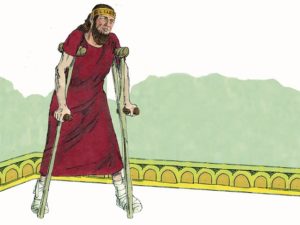 And Asa fell sick… of a most violent pain in his feet, and yet in his illness he did not seek the Lord, but rather trusted in the skill of physicians. And he slept with his fathers: and he died in the one and fortieth year of his reign.
And Asa fell sick… of a most violent pain in his feet, and yet in his illness he did not seek the Lord, but rather trusted in the skill of physicians. And he slept with his fathers: and he died in the one and fortieth year of his reign.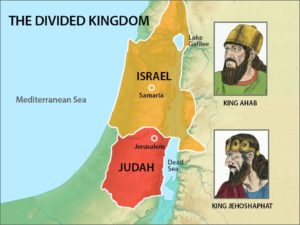 And the fear of the Lord came upon all the kingdoms of the lands that were round about Juda, and they durst not make war against Josaphat. The Philistines brought presents to Josaphat… and the Arabians brought him cattle…
And the fear of the Lord came upon all the kingdoms of the lands that were round about Juda, and they durst not make war against Josaphat. The Philistines brought presents to Josaphat… and the Arabians brought him cattle…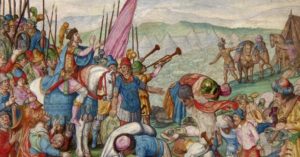 Now therefore behold the children of Ammon, and of Moab, and mount Seir, through whose lands thou didst not allow Israel to pass, when they came out of Egypt, but they turned aside from them, and slew them not, do the contrary, and endeavor to cast us out of the possession which thou hast delivered to us.
Now therefore behold the children of Ammon, and of Moab, and mount Seir, through whose lands thou didst not allow Israel to pass, when they came out of Egypt, but they turned aside from them, and slew them not, do the contrary, and endeavor to cast us out of the possession which thou hast delivered to us.
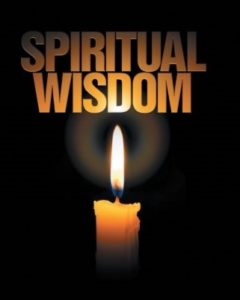 The First Epistle of Saint Paul the Apostle to the Corinthians is pure gold in terms of a source of spiritual insight, understanding, and wisdom!
The First Epistle of Saint Paul the Apostle to the Corinthians is pure gold in terms of a source of spiritual insight, understanding, and wisdom!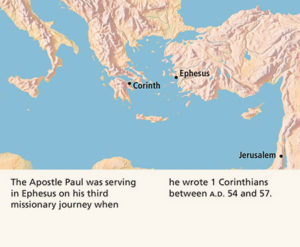 Now, brethren, I have applied these things to myself and Apollos by way of illustration for your sakes, that in our case you may learn not to be puffed up one against the other over a third party, transgressing what is written. For who singles thee out? Or what hast thou that thou hast not received? And if thou hast received it, why dost thou boast as if thou hadst not received it? You are already filled! You are already made rich! Without us you reign! And would that you did reign, that we too might reign with you! For I think God has set forth us the apostle last of all, as men doomed to death, seeing the we have been made a spectacle to the world, and to angels, and to men. We are fools for Christ, but you are wise in Christ! We are weak, but you are strong! You are honored, but we are without honor! To this very hour we hunger and thirst, and we are naked and buffeted, and have no fixed abode. And we toil, working with our own hands. We are reviled and we bless, we are persecuted and we bear with it, we are maligned and we entreat, we have become as the refuse of this world, the off scouring of all, even until now!
Now, brethren, I have applied these things to myself and Apollos by way of illustration for your sakes, that in our case you may learn not to be puffed up one against the other over a third party, transgressing what is written. For who singles thee out? Or what hast thou that thou hast not received? And if thou hast received it, why dost thou boast as if thou hadst not received it? You are already filled! You are already made rich! Without us you reign! And would that you did reign, that we too might reign with you! For I think God has set forth us the apostle last of all, as men doomed to death, seeing the we have been made a spectacle to the world, and to angels, and to men. We are fools for Christ, but you are wise in Christ! We are weak, but you are strong! You are honored, but we are without honor! To this very hour we hunger and thirst, and we are naked and buffeted, and have no fixed abode. And we toil, working with our own hands. We are reviled and we bless, we are persecuted and we bear with it, we are maligned and we entreat, we have become as the refuse of this world, the off scouring of all, even until now!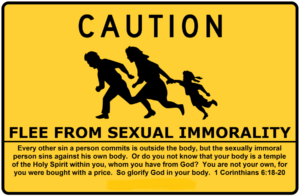 It is actually reported that there is immorality among you, and such immorality as is not found even among the Gentiles, that a man should have his father’s wife. And you are puffed up, and have not rather mourned so that he who hast done this deed might be put away from your midst. I indeed, absent in body but present in spirit, have already, as though present, passed judgment in the name of our Lord Jesus Christ on the one who has so acted—you and my spirit gathered together with the power of our Lord Jesus—to deliver such a one over to Satan for the destruction of the flesh, that his spirit may be saved in the day of our Lord Jesus Christ. Your boasting is unseemly. Do you not know that a little leaven ferments the whole lump? Purge out the old leaven, that you may be a new dough, as you really are without leaven. For Christ, our Passover, has been sacrificed. Therefore let us keep festival, not with the old leaven, nor with the leaven of malice and wickedness, but with the unleavened bread of sincerity and truth.
It is actually reported that there is immorality among you, and such immorality as is not found even among the Gentiles, that a man should have his father’s wife. And you are puffed up, and have not rather mourned so that he who hast done this deed might be put away from your midst. I indeed, absent in body but present in spirit, have already, as though present, passed judgment in the name of our Lord Jesus Christ on the one who has so acted—you and my spirit gathered together with the power of our Lord Jesus—to deliver such a one over to Satan for the destruction of the flesh, that his spirit may be saved in the day of our Lord Jesus Christ. Your boasting is unseemly. Do you not know that a little leaven ferments the whole lump? Purge out the old leaven, that you may be a new dough, as you really are without leaven. For Christ, our Passover, has been sacrificed. Therefore let us keep festival, not with the old leaven, nor with the leaven of malice and wickedness, but with the unleavened bread of sincerity and truth. Nay, to begin with, it is altogether a defect in you that you have lawsuits with one another. Why not rather suffer wrong? Why not rather be defrauded? But you yourselves do wrong and defraud, and that to your brethren. Or do you not know that the unjust will not possess the kingdom of God? Do not err, neither fornicators, nor idolaters, nor adulterers, nor the effeminate, nor sodomites, nor thieves, nor the covetous, nor drunkards, nor the evil-tongued, nor the greedy will possess the kingdom of God. And such were some of you, but you have been washed, you have been sanctified, you have been justified in the name of our Lord Jesus Christ, and in the Spirit of God.
Nay, to begin with, it is altogether a defect in you that you have lawsuits with one another. Why not rather suffer wrong? Why not rather be defrauded? But you yourselves do wrong and defraud, and that to your brethren. Or do you not know that the unjust will not possess the kingdom of God? Do not err, neither fornicators, nor idolaters, nor adulterers, nor the effeminate, nor sodomites, nor thieves, nor the covetous, nor drunkards, nor the evil-tongued, nor the greedy will possess the kingdom of God. And such were some of you, but you have been washed, you have been sanctified, you have been justified in the name of our Lord Jesus Christ, and in the Spirit of God.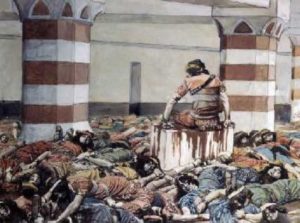 Joran was two and thirty years old when he began to reign: and he reigned eight years in Jerusalem. And he walked in the ways of the kings of Israel, as the house of Achab had done: for his wife was a daughter of Achab, and he did evil in the sight of the Lord. But the Lord would not destroy the house of David: because of the covenant which he made with him: and because he had promised to give a lamp to him, and to his sons for ever.
Joran was two and thirty years old when he began to reign: and he reigned eight years in Jerusalem. And he walked in the ways of the kings of Israel, as the house of Achab had done: for his wife was a daughter of Achab, and he did evil in the sight of the Lord. But the Lord would not destroy the house of David: because of the covenant which he made with him: and because he had promised to give a lamp to him, and to his sons for ever.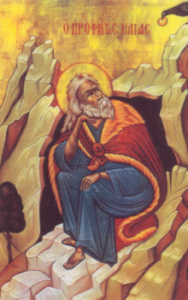 And the Lord stirred up against Joram the spirit of the Philistines, and of the Arabians, who border on the Ethiopians. And thy came up into the land of Juda, and wasted it, and they carried away all the substance that was found in the king’s house, his sons also, and his wives, so that there was no son left him but Joachaz, who was the youngest.
And the Lord stirred up against Joram the spirit of the Philistines, and of the Arabians, who border on the Ethiopians. And thy came up into the land of Juda, and wasted it, and they carried away all the substance that was found in the king’s house, his sons also, and his wives, so that there was no son left him but Joachaz, who was the youngest.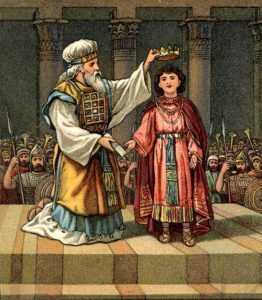 Joas was seven years old when he began to reign: and he reigned forty years in Jerusalem… And he did that which is good before the Lord all the days of Joiada the priest.
Joas was seven years old when he began to reign: and he reigned forty years in Jerusalem… And he did that which is good before the Lord all the days of Joiada the priest.
 Saint Paul in this letter to the Christians of Corinth denounces certain abuses, e.g., rivalries among themselves, incest, appealing to pagan courts, and fornication. He then answers questions they had proposed to him on marriage and celibacy, on eating the meats offered to idols, on abuses in the celebration of the Eucharist, on various gifts of the Holy Spirit, and on the future resurrection.
Saint Paul in this letter to the Christians of Corinth denounces certain abuses, e.g., rivalries among themselves, incest, appealing to pagan courts, and fornication. He then answers questions they had proposed to him on marriage and celibacy, on eating the meats offered to idols, on abuses in the celebration of the Eucharist, on various gifts of the Holy Spirit, and on the future resurrection. Only, as the Lord has alloted to each, as when God has called each, so let him walk—and so I teach in all the churches. Was one called having been circumcised? Let him not become uncircumcised. Was one called having been uncircumcised? Let him not be circumcised. Circumcision does not matter, and uncircumcision does not matter; but the keeping of the commandments of God is what matters. Let every man remain in the calling in which he was called. Wast thou a slave when called? Let it not trouble thee. But if thou canst become free, make use of it rather. For a slave who has been called in the Lord, is a freedman of the Lord; just as a freeman who has been called is a slave to Christ. You have been bought with a price; do not become the slaves of men. Brethren, in the state in which he was when called, let every man remain with God.
Only, as the Lord has alloted to each, as when God has called each, so let him walk—and so I teach in all the churches. Was one called having been circumcised? Let him not become uncircumcised. Was one called having been uncircumcised? Let him not be circumcised. Circumcision does not matter, and uncircumcision does not matter; but the keeping of the commandments of God is what matters. Let every man remain in the calling in which he was called. Wast thou a slave when called? Let it not trouble thee. But if thou canst become free, make use of it rather. For a slave who has been called in the Lord, is a freedman of the Lord; just as a freeman who has been called is a slave to Christ. You have been bought with a price; do not become the slaves of men. Brethren, in the state in which he was when called, let every man remain with God. But this I say, brethren, the time is short; it remains that those who have wives be as if they had none; and those who weep, as though not weeping; and those who rejoice, as though not rejoicing; and those who buy, as though not possessing; and those who use this world, as though not using it, for this world as we see it is passing away. I would have you free from care. He who is unmarried is concerned about the things of the Lord, how he may please God. Whereas he who is married is concerned about the things of the world, how he may please his wife; and he is divided. And the unmarried woman, and the virgin, thinks about the things of the Lord, that she may be holy in body and spirit. Whereas she who is married thinks about the things of the world, how she may please her husband. Now this I say for your benefit, not to hold you in check, but to promote what is proper, and to make it possible for you to pray to the Lord without distraction.
But this I say, brethren, the time is short; it remains that those who have wives be as if they had none; and those who weep, as though not weeping; and those who rejoice, as though not rejoicing; and those who buy, as though not possessing; and those who use this world, as though not using it, for this world as we see it is passing away. I would have you free from care. He who is unmarried is concerned about the things of the Lord, how he may please God. Whereas he who is married is concerned about the things of the world, how he may please his wife; and he is divided. And the unmarried woman, and the virgin, thinks about the things of the Lord, that she may be holy in body and spirit. Whereas she who is married thinks about the things of the world, how she may please her husband. Now this I say for your benefit, not to hold you in check, but to promote what is proper, and to make it possible for you to pray to the Lord without distraction.
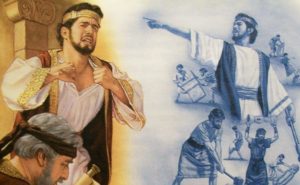 Ezechias, and all the people rejoiced because the ministry of the Lord was accomplished. For the resolution of doing this thing was taken suddenly.
Ezechias, and all the people rejoiced because the ministry of the Lord was accomplished. For the resolution of doing this thing was taken suddenly.